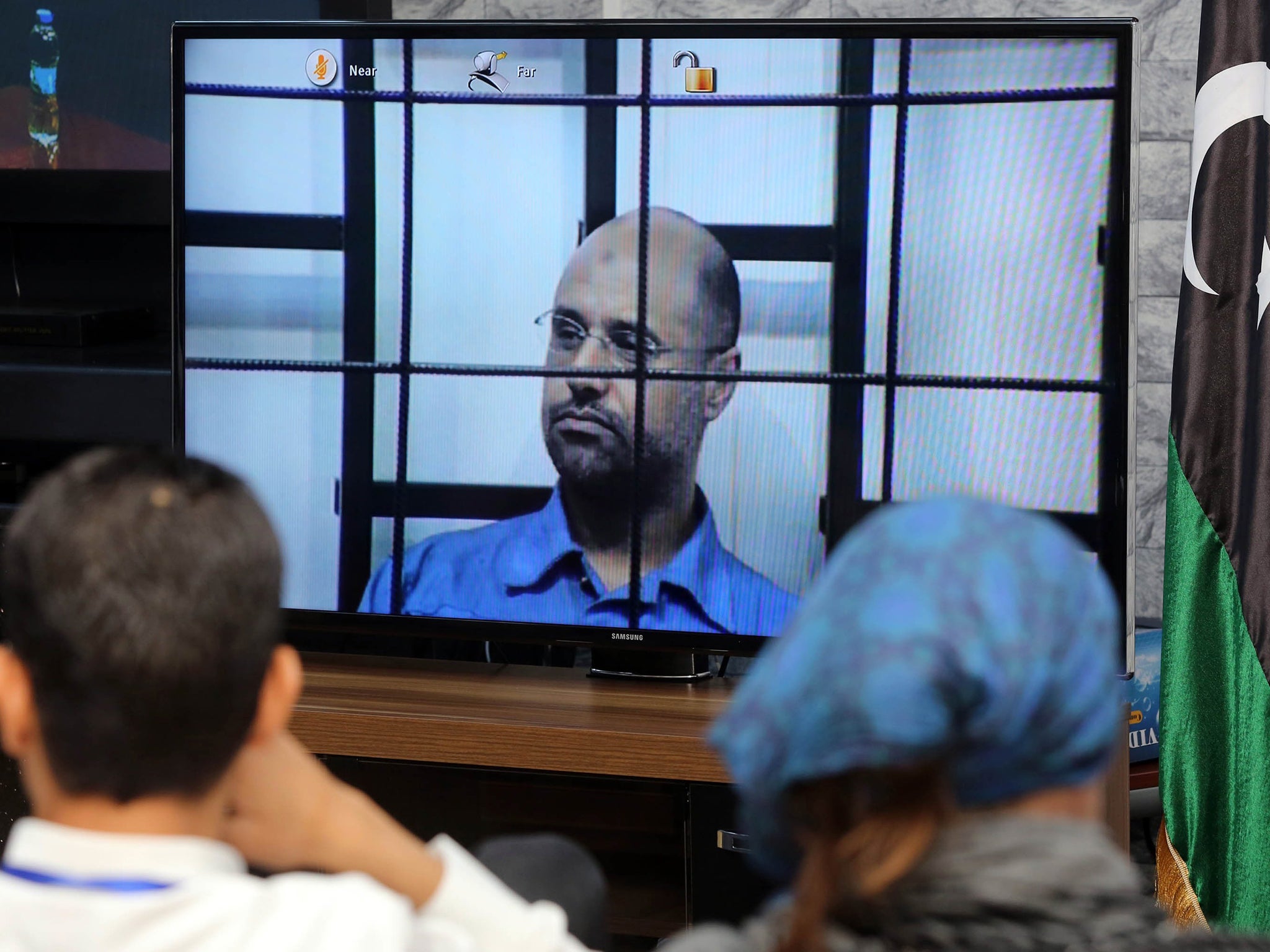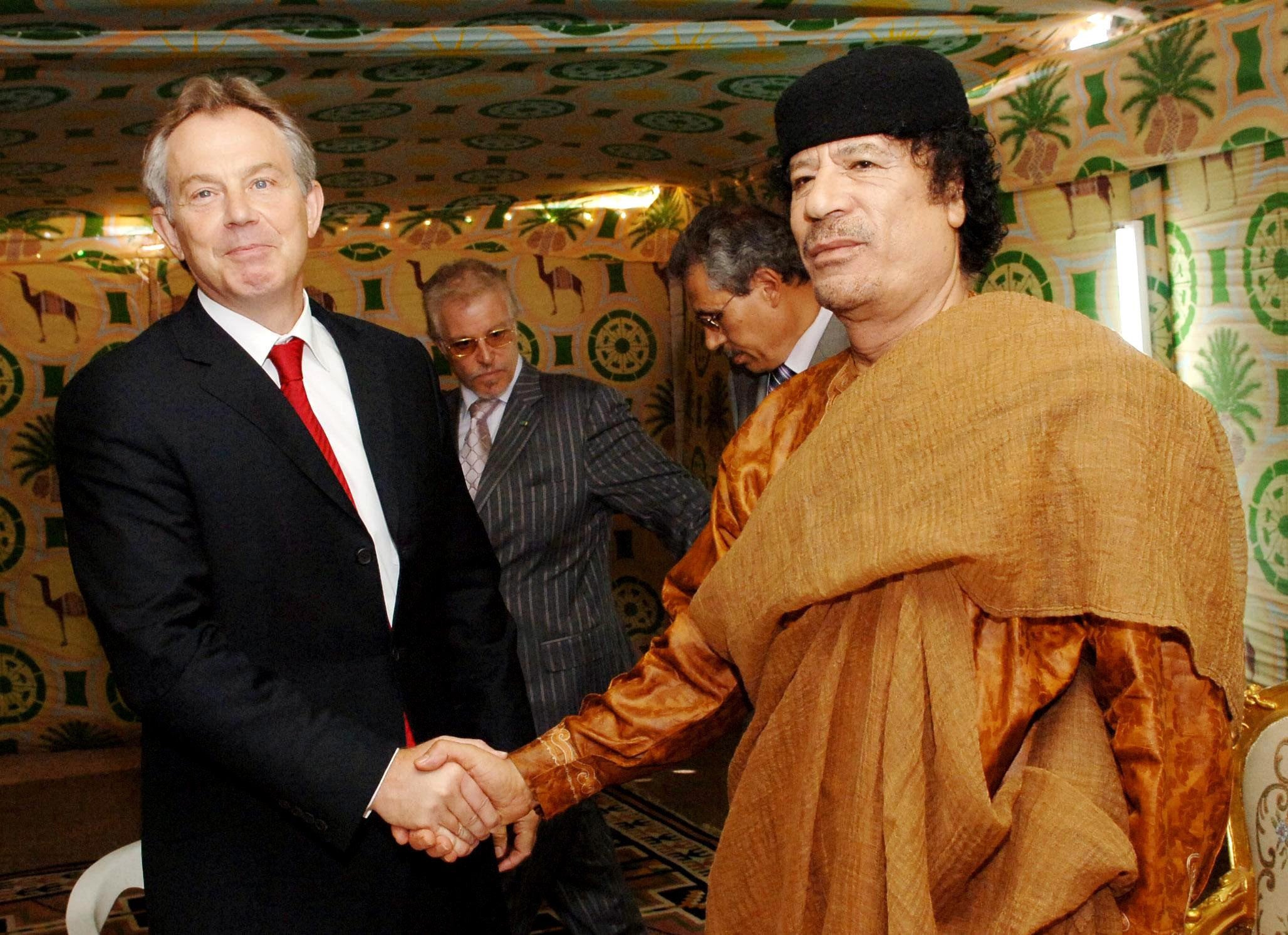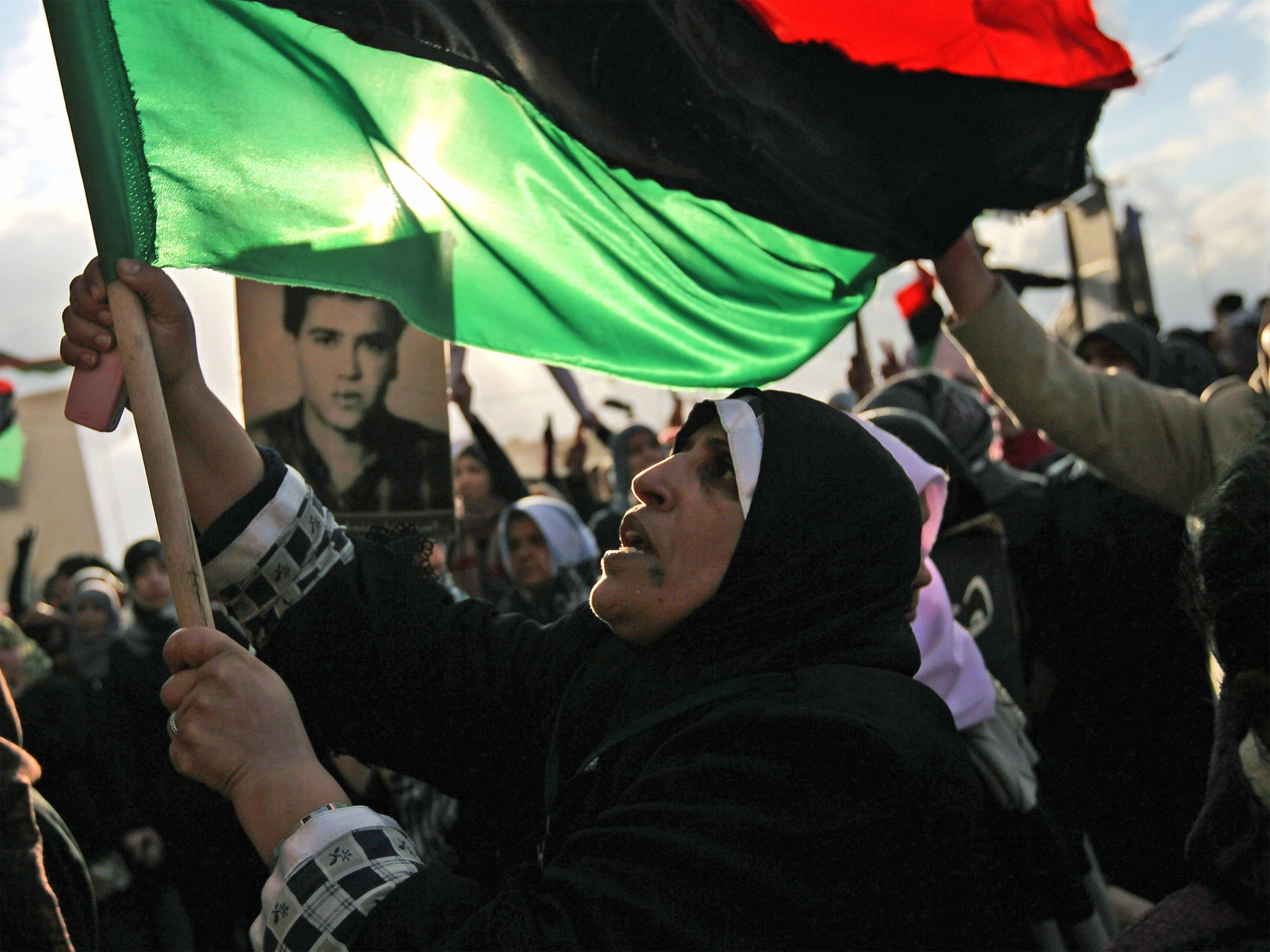Having cheated death five times, Colonel Gaddafi's son is reportedly planning to run for the Libyan presidency
Saif al-Islam is said to be planning to stand for election, three years after being sentenced to death for ordering air strikes on civilians and incitement to murder and rape
Your support helps us to tell the story
From reproductive rights to climate change to Big Tech, The Independent is on the ground when the story is developing. Whether it's investigating the financials of Elon Musk's pro-Trump PAC or producing our latest documentary, 'The A Word', which shines a light on the American women fighting for reproductive rights, we know how important it is to parse out the facts from the messaging.
At such a critical moment in US history, we need reporters on the ground. Your donation allows us to keep sending journalists to speak to both sides of the story.
The Independent is trusted by Americans across the entire political spectrum. And unlike many other quality news outlets, we choose not to lock Americans out of our reporting and analysis with paywalls. We believe quality journalism should be available to everyone, paid for by those who can afford it.
Your support makes all the difference.The son of Colonel Muammar Gaddafi is thought to be planning to stand for election as president of Libya, seven years after his father was overthrown and killed.
Saif al-Islam Gaddafi was sentenced, in absentia, to death by firing squad for alleged crimes that included incitement to murder and rape.
Now his spokesman has reportedly announced he will be standing as presidential candidate on the ticket of the Popular Front for the Liberation of Libya, a party formed in December 2016 with a promise to liberate the country “from control of terrorist organisations”.
Gaddafi’s spokesman Ayman Boras was quoted as telling a press conference in Tunisia that the late dictator’s second oldest son had a vision of “restoring the Libyan state, making it for everyone”.
Although his candidacy might seem improbable to outsiders, the human rights activist Khaled Guel told pan-Arab media outlet Al-Araby Al-Jadeed: “The humanitarian situation is deteriorating and the path forward is unclear, therefore many Libyans now believe the only way to save the country is through Saif al-Islam.”
There appear to be no legal barriers to him standing. A 2013 law banning Gaddafi-era officials from holding public office was revoked in 2015.
If he were elected it would represent yet another turn in the fortunes of the 45-year-old who as a young man was regarded as “the Prince of Libya”, his father’s designated successor.

He was once feted as the regime’s reforming face, keeping a pair of white tigers in Libya and a mansion in London, and mixing with the likes of Prince Andrew, Peter Mandelson and Nat Rothschild.
But his brutal attempts to crush the 2011 Libyan revolution led to him becoming a fugitive wanted by the International Criminal Court in The Hague for crimes against humanity.
Having vowed to fight the revolution to the last bullet, in November 2011 he allowed rebels to capture him without firing a shot.
That he has now survived to the point where there can be talk of him running for Libyan president is perhaps remarkable.
It could be said that Gaddafi has so far cheated death at least five times.
His death sentence – for crimes that also included shooting into crowds of demonstrators and ordering air strikes on civilians – was passed in July 2015, by a Tripoli court at which he had appeared via video link.

The execution could not be carried out, however, because by the time the sentence was passed, the country had descended into chaos, and the militia holding Gaddafi in the north-western mountain town of Zintan refused to recognise the authority of the Libya Dawn military coalition 85 miles away in Tripoli.
The dictator’s son also appears to have been lucky to survive a Nato air strike that wounded but didn’t kill him a month before his capture.
Before that, in August 2011 he had been absent when a Nato air strike flattened the country mansion near Tripoli where he kept and played with white tigers and where the extensive grounds reportedly contained a private zoo filled with pumas, lions, gazelles and other animals.
Saif al-Islam also seems to have counted himself lucky to have avoided the fate of his father, who in October 2011 after the fall of Tripoli was dragged from a drainage pipe near Sirte, sodomised with a bayonet and shot.
When Saif al-Islam was caught the following month, one of his captors was quoted as saying: “He was very scared. He thought we would kill him.”
Years before that, Islamists had plotted to kill the young Gaddafi – but were foiled by MI6.
Secret files discovered by The Independent seven years ago showed that in January 2004 MI6 responded to intelligence about a plot to assassinate Saif al-Islam in London and got Special Branch to put him on its at-risk register while sending police to brief him about the threat to his life.
At that time Gaddafi junior was regarded by Western diplomats as the reform-minded best hope of steering his father away from dictatorship towards democracy.

In one document uncovered by The Independent his contribution to the Libyan regime’s attempts to change its pariah status after the start of the War on Terror was regarded as “highly constructive and welcome”.
Six days before Tony Blair did his “deal in the desert” with Gaddafi senior, a Guardian interviewer reported finding Gaddafi junior in a mansion near Hyde Park, dressed in designer jeans, exuding charm while being served orange juice by his British butler.
Saif al-Islam, it was noted – with considerable scepticism – was being received by heads of state and acting as “his father’s more affable alter ego”.
In 2005 he was in Davos, extolling the virtues of democracy as he rubbed shoulders with global elite at the World Economic Forum.
In these halcyon days he met the Duke of York twice, once at Buckingham Palace and once in Tripoli. In her book Sandstorm the journalist Lindsey Hilsum described Gaddafi being invited to parties at the financier Nat Rothschild’s house in Corfu, where the other guests included Peter Mandelson and the Russian oligarch Oleg Deripaska.
He studied aspects of democratisation to get a PhD from the London School of Economics and in 2008 when he pledged to donate £1.5m to the university for a global governance unit, Professor David Held declared: “I’ve come to know Saif as someone who looks to democracy, civil society and deep liberal values for the core of his inspiration.”
And then the Libyan uprising started.
Pretty quickly, Saif al-Islam the previously affable alter ego was being described as “urbane, charming and psychotic”.
This seemed to be confirmed by a ranting televised broadcast to the nation on 20 February 2011.
Wagging his finger at the Libyan people as if scolding naughty children, he warned them of the dangers of overthrowing his father’s government.
“There will be civil war in Libya,” he told them. “We will kill one another in the streets.
“Instead of crying over 84 casualties, we will be crying over hundreds of thousands of dead. Rivers of blood will flow through all the cities of Libya.”
But he, his father and his father’s army were not going to let that happen.
“We will destroy all the dens of strife,” he said. “Our army will support Libya and Muammar al-Gaddafi to the last moment, and it will be victorious, Allah willing.”
“We will fight to our very last man, woman, and bullet,” he vowed. “Under no circumstances will we leave our country.”
He was caught nine months later, in the southern desert, as he tried to flee to Niger.
There were conflicting reports about whether Gaddafi had been injured in a Nato air strike, as he insisted, or whether one of his captors had tried to cut off the finger that had been wagged so insultingly at the Libyan people.
But as Libya slid into a civil war that was exploited by Isis militants and others, some revised their opinion of his finger-wagging rant and came to see it as prophetic.
At about the time of his trial small “free Saif al-Islam” demonstrations were held in some Libyan cities, the first pro-Gaddafi demonstrations to have occurred since the downfall of the dictatorship.
In June 2017, the Abu Bakr al-Siddiq Battalion, the militia controlling Zintan, announced it had freed Saif al-Islam at the request of the Libyan House of Representatives (HoR), the parliament based at the other end of the country, in the eastern city of Tobruk.
His whereabouts since his release has been a mystery, but in reporting on his planned presidential bid, Al-Araby Al-Jadeed quoted “sources” as saying that Gaddafi had stayed on the outskirts of Zintan, holding regular secret meetings with other members of the Popular Front party.

His spokesman Mr Boras told Al-Araby Al-Jadeed that Saif al-Islam’s reforms will appeal to many Libyans and that unlike his father he was not a “military man”.
Mr Boras was quoted as saying Gaddafi would announce the details of his election campaign soon, and insisted that the presidential hopeful had a “modern” and “open-minded” vision for Libya which rejected violence.
But HoR member Mohammad al-Darrat told Al Jazeera that Gaddafi’s apparent intention to stand for election should be ignored, arguing: “If Saif al-Islam wants to return to power, what was the point of the revolution?”
He was contradicted by Saleh Afihima, another HoR member who said that supporters of the old regime needed to be included in the democratic process if there was to be true national reconciliation and “if we want to reach a real state”.
Al Jazeera reported that some Libyan tribes retained a fondness for the old regime, especially in the south, the Warshefana region and around Sirte, Colonel Gaddafi’s birthplace.
Quite what Gaddafi could rule if elected president is unclear. Libya currently has three rival governments: the HoR in Tobruk, the UN-backed Government of National Accord in Tripoli, and, in the same city, the Government of National Salvation.

Join our commenting forum
Join thought-provoking conversations, follow other Independent readers and see their replies
Comments